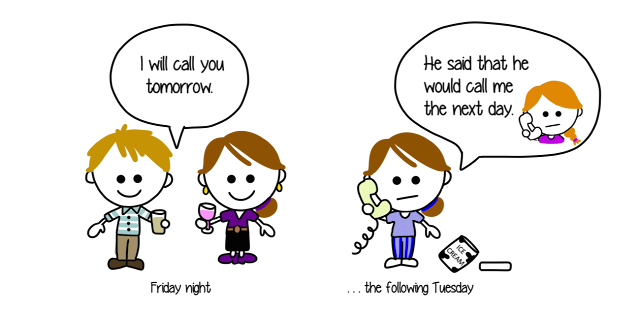The Other way is to express the Other's words in your own style and words, this is called Indirect Speech. The Words inside inverted commas are called reported Speech while the words outside the inverted commas are called Reporting speech.
For Example:
Directed: Kristie Jones said, "I am not angry"
Indirect: Kristie Jones said that he was not angry.
Directed: She said to Messi, "I am waiting for a letter".
Indirect: She Said to Ali that she was waiting for a letter.
Directed: Owen Azzopardi said to me, " you are getting lazy".
Indirect: Owen Azzopardi told me that I was getting lazy.
 |
| Photo Source: http://anubhavigurukulam.com |
How to change Direct Speech to Indirect Speech?
When we convert Direct into indirect speech, we should make the following changes.
- The Changes in Say to and Said to.
- The Change in inverted commas.
- The Change in pronouns/Persons
- The Change in the tense of the sentence.
- The change in Particular words.
1) The Changes in Say to and Said to:
To Make changes in say to and said to we have to study the Reported speech carefully. By Studying Reported speech (second part of the sentence) Briefly we will make changes in say to and said to.
We commonly change 'said to' to the following words.
- Told - If the reporting speech shows a talk/speech been conveyed.
- Asked - If the Reporting speech shows something been asked.
- Foretold - if the Reporting speech shows predictions.
- Exclaimed with wonder - If the reporting speech shows wonder.
- Proposed - If the Reporting speech shows suggestions.
- Exclaimed with Sorrow - If the Reporting Speech shows sadness.
- Forbade - If the reporting speech shows something which forbidden.
2) The Changes in Commas and Inverted commas:
We make changes in commas and in inverted commas in the following conditions.
- In Simple Sentences, we replace comma and inverted by the word 'that'.
- If a Sentence shows sadness, happiness, wonder or wish we still replace the commas and inverted commas with the Word 'That'.
- If a sentence shows Order, Suggestions or Request we replace the Commas and inverted commas with the word 'To'.
- In a Simple interrogative Sentences, we replace the commas and inverted commas by the word 'Whether'.
- In Complex Interrogative Sentences we just simply remove the Commas and inverted commas.
3) Changes in Tense:
If the Reporting Speech is in the Past tense, The Reported Speech will also change to Past tense and 2nd form of the verb will take place.
- Is and Am will change to was.
- May will change to might.
- Must will change to should.
- was and were will change to Had been.
- Has and have will change to Had.
If the Reporting speech is in the past tense and Reported speech shows a universal fact then the Tense of the sentence will not change.
If the Reporting Speech is in the present or future tense, then the tense of the reported Speech will not change.
4) Changes in Particular Words:
The Following words will change when we convert Directed speech to indirect speech.
These will Become Those.
Now will become then.
Ago will become Before.
Here will become there.
Thus will Become So.
Yesterday will become the previous day.
Hence will become thence.

No comments:
Post a Comment